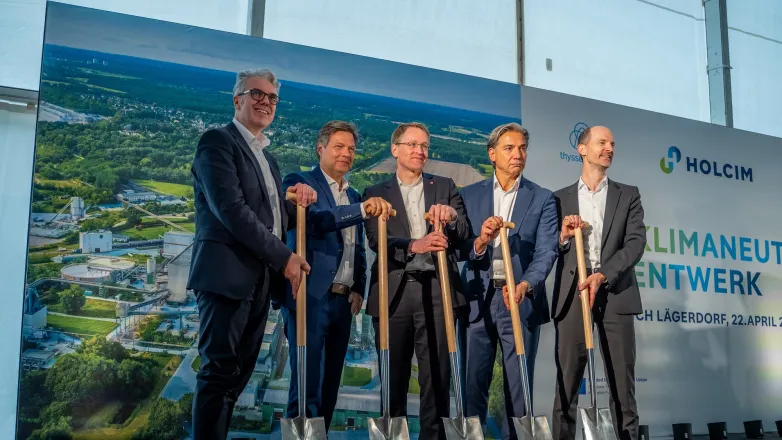
- Holcim Germany will be commissioning one of the world’s first climate-neutral cement plants in Lägerdorf (Schleswig-Holstein) from 2028
- New kiln line and CO2 processing unit for almost complete capture of CO2 and utilisation as a raw material in industry
- Thorsten Hahn, CEO Holcim Germany: “CO2 will be a scarce commodity in the future. The CO2 economy creates sustainable prosperity.”
One of the world’s first climate-neutral cement plants is taking shape: Vice-Chancellor and Federal Minister of Economics Dr. Robert Habeck and the Minister President of Schleswig-Holstein, Daniel Günther, together with Holcim Germany CEO Thorsten Hahn, have initiated the “Carbon2Business” innovation project in Lägerdorf on Monday. By 2028, the site will be home to a cement plant that uses a new technology to capture CO2 on an industrial scale, enabling the greenhouse gas to be almost completely captured from the exhaust air. The CO2 will then be processed for use as a raw material in industry.
To this end, Holcim Germany is building a new kiln line using pure oxygen to burn cement clinker and a CO2 processing unit at the Lägerdorf plant. With this technology, Holcim and its project partners thyssenkrupp Polysius and Linde Engineering are advancing CO2 capture on an industrial scale and contributing to the development of a CO2 economy in Germany.
Habeck: “Prime example of green transformation”
Federal Minister Robert Habeck: “The cement industry is facing a particularly big challenge when it comes to decarbonisation. Here in Lägerdorf, it is shown how it can be done: decarbonising production and boldly implementing climate-neutral production of cement and concrete. The fact that carbon dioxide can not only be captured, but also used as a raw material, is a prime example of green transformation.”
“Today we are giving the go-ahead for another innovative German industrial project. The prototype for the decarbonisation of the cement industry will be built on an industrial scale in Lägerdorf. This shows once again that the future is climate-neutral. And this future begins here in Schleswig-Holstein, the number one state for energy transition,” said Daniel Günther, Minister President of Schleswig-Holstein.
“We’re laying the groundwork for a sustainable world through cement,” asserts Thorsten Hahn, CEO of Holcim Germany. “Cement is essential for our cities, factories, homes, bridges, and beyond. As we transition towards renewable energy, we must also construct the foundations and structures for wind turbines and railway tracks. With our climate-neutral cement plant, we ensure that this vital building material remains accessible without further harm to the atmosphere.” CO2 emissions are an inherent part of cement production. The burning process releases the majority of CO2, approximately two-thirds, from the minerals themselves. Even with the utilization of renewable energy in operating the cement kiln, these emissions persist. Hahn emphasizes, “Through this groundbreaking project, we’re fostering sustainable prosperity. By capturing and repurposing CO2 as a valuable raw material, we’re mitigating climate impact and facilitating the development of new value chains.”
In Lägerdorf, Holcim, alongside project partners thyssenkrupp Polysius and Linde Engineering, is erecting a second-generation oxyfuel kiln and a CO2 Processing Unit (CPU). Unlike conventional methods, this kiln will utilize pure oxygen instead of ambient air, yielding a process gas enriched with CO2. Subsequently, this gas undergoes purification and processing within the CPU. Holcim Germany’s investment in this climate-neutral cement plant totals in the mid three-digit million euro range. Additionally, the EU is providing funding support to the tune of approximately 110 million euros for the project.
Utilising CO2: The importance of carbon-based raw materials within the industry
Carbon is an important raw material for sectors such as the chemical industry, where it is used to make plastics, tyres, speciality chemicals and medicines. Due to climate protection measures and the phase-out of fossil fuels, the industry will need new sources in the future. Captured and processed CO2 (Carbon Capture and Utilisation/CCU) can fill this gap.
The successful development of this market necessitates adequate infrastructure, encompassing pipelines, intermediate storage facilities, and transshipment hubs for shipping, alongside legal regulations for transportation.
Hahn remarked, “The German government and the EU are addressing these issues in their carbon management strategies. As a partner, we stand ready to collaborate with policymakers to propel Germany’s CO2 economy forward.”
Holcim Germany has set ambitious decarbonization goals. Alongside the climate-neutral cement plant in Lägerdorf, scheduled to commence operations in 2028, test projects are presently underway at other cement plants in Höver (Lower Saxony) and Beckum (North Rhine-Westphalia). These facilities are also slated for conversion, integrating technologies for capturing and processing CO2.
More information on the carbon-neutral cement plant can be found at carbon2business.com.
About the Holcim Germany Group
Holcim Germany is one of the leading companies in Germany for innovative, sustainable and digital construction products and solutions. As a pioneer in sustainable construction, Holcim employees develop customised solutions for building owners, construction companies, architects and engineers – combined with a clear focus on climate protection and the circular economy. Our mission: Building more with less material. Holcim lives diversity: the Group employs around 1,800 people of 36 different nationalities at around 130 locations in Germany and the Netherlands. Holcim Germany is a subsidiary of the world’s leading building materials group Holcim Ltd.
Source
Holcim Deutschland, press release, 2024-04-22.
Supplier
Holcim Deutschland
Linde Engineering Dresden GmbH
thyssenkrupp Polysius GmbH
Share
Renewable Carbon News – Daily Newsletter
Subscribe to our daily email newsletter – the world's leading newsletter on renewable materials and chemicals









